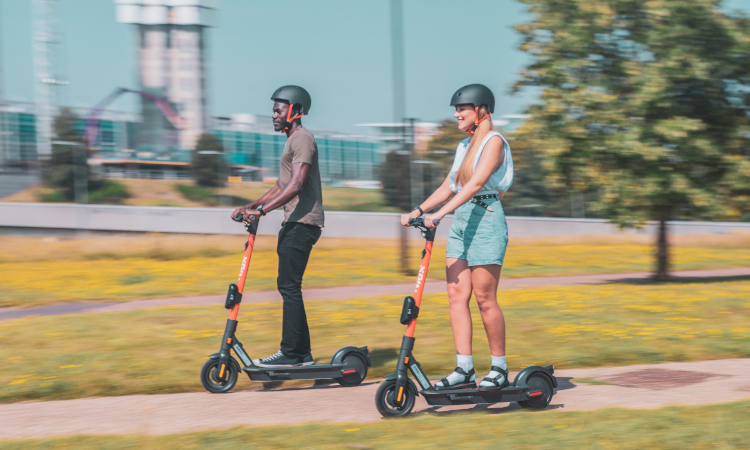What will 2021 look like for the transport industry?
- Like
- Digg
- Del
- Tumblr
- VKontakte
- Buffer
- Love This
- Odnoklassniki
- Meneame
- Blogger
- Amazon
- Yahoo Mail
- Gmail
- AOL
- Newsvine
- HackerNews
- Evernote
- MySpace
- Mail.ru
- Viadeo
- Line
- Comments
- Yummly
- SMS
- Viber
- Telegram
- Subscribe
- Skype
- Facebook Messenger
- Kakao
- LiveJournal
- Yammer
- Edgar
- Fintel
- Mix
- Instapaper
- Copy Link
Posted: 11 February 2021 | Steve Pyer - Spin | No comments yet
UK Country Manager at Spin Steve Pyer discusses how the pandemic has changed mindsets towards micromobility, and calls on the industry to ensure sustainability progress is continued.


Individuals, families, healthcare systems and businesses have all been tested to the limits during the pandemic, but there’s also been true resilience and change that has led to new innovations. As we look forward to a post-pandemic world, many of the changing patterns in consumer behaviour and attitudes are here to stay.
Our colleagues at Ford have looked at what this means for the broader transport industry in 2021 and the innovative ways business and people have found to cope and connect. Here some key trends that could dominate 2021.
Personal transportation is flourishing
The use of public transport due to the pandemic has decreased globally, with Ford discovering that 52 per cent of adults are less likely to ride the metro or bus, and 50 per cent less likely to catch a train. As a result, socially-distanced, greener personal transportation options are flourishing. Bike sales have soared and the investment in electric vehicles is accelerating.
The Corporate Electric Vehicle Alliance, for example, is a collaborative group of organisations, that includes Amazon, IKEA and DHL, that’s committed to transitioning all transportation and logistics fleets to electric vehicles.
We see evidence at our operations that e-scooters are being adopted internationally at a fast pace, from the US, to Germany, and now to the UK, and we expect more countries such as Spain to follow suit.
We believe that e-scooters offer a safer, more socially-distanced and greener way to travel and we’ve seen a clear positive transport mode shift already by our Milton Keynes riders. 62 per cent of riders say they have used an e-scooter instead of driving alone in a car journey at least once, with 27 per cent making the replacement for their last trip.
Our desire to escape the ordinary has heightened
For many of us, days, weeks, and months are blurring from one to the next and the boundaries between work and home life have become less defined. As a result, whether we have a bit of cabin fever, are feeling exhausted, or just have an underlying sense of unease, a lot of us are looking for inventive new ways to escape the ordinary.
Vehicles are becoming a place to relax, get privacy and even to work. This is one of the reasons Ford introduced the Bronco & Bronco to four locations in the US, while PaulCamper, an RV rental marketplace saw a 100 per cent year-on-year increase in bookings last year in Europe.
It’s no wonder we’re seeing continued uptake of our e-scooters when government restrictions permit. As well as getting people from A to B for work or to shop for groceries, people are riding spontaneously for fun, to get some fresh air, grab a coffee and embrace the allure of the outdoors.


Many have used e-scooters as a way to get outdoors during the COVID-19 pandemic
Sustainability is firmly on the map
As the world continues to struggle with a global health crisis, it’s also spotlighted the health of our planet. Air quality emerged as a possible silver lining to the worldwide lockdowns and was a launchpad for businesses and consumers alike to consider their environmental impact. But being sustainable and staying sustainable are not always the same thing – long-term efforts need to be put in place now.
Renowned brands are starting to change the consumer conversation with the likes of Adidas creating Futurecraft.Loop, a circular sustainable product. These 100 per cent recyclable running shoes can be returned once they’ve been used to the max to then make more future shoes.
In addition, Yallah Coffee delivered coffee to the UK from Columbia on a wind-powered sailboat, travelling 7,500-nautical-miles, which dramatically reduced its environmental impact and enabled it to provide fair pricing to growers and customers.
Micromobility is also a powerful, transparent, and accountable ally in the fight against climate change. At Spin, we have an ambitious global sustainability programme, setting an industry-leading goal to become carbon negative by 2025. This includes initiatives for electrified operations, renewable power, lower manufacturing impacts, and encouraging a mode-shift away from car use.
We must all take bold steps forward to serve our customers, communities, and the planet better than ever before as we move through unchartered territory together.
Biography
Steve is Spin’s UK Country Manager, bringing over 15 years of experience within the micromobility sector. He joined Spin in September of this year and is responsible for managing Spin’s operations and stakeholder relationships within the UK. Prior to Spin, Steve was General Manager at Madrid based MaaS company, Ride On.
Related topics
Air Quality, COVID-19, On-Demand Transport, Passenger Experience, Sustainable Urban Transport
Related modes
Bikes & Scooters








